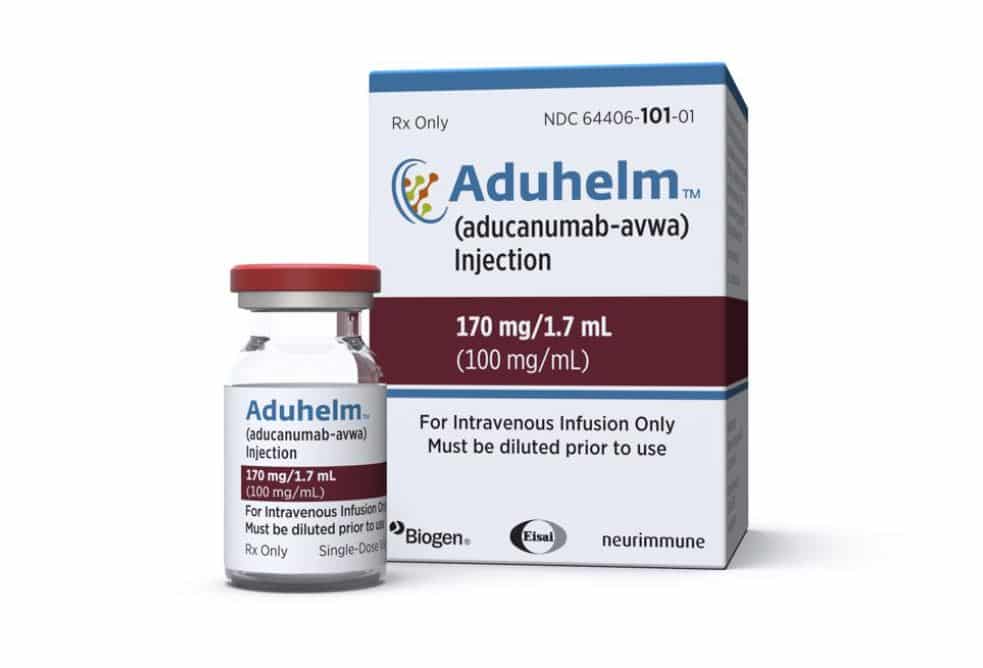Medicare Limits Coverage of Aduhelm to Patients in Clinical Trials

WASHINGTON — Despite pressure to go another way, Medicare on Thursday evening announced it will only cover the new Alzheimer’s disease drug Aduhelm for people participating in a clinical trial.
The decision came as something of a surprise as Medicare almost always automatically pays for drugs that have received Food and Drug Administration approval, and appears, for the moment at least, to be the closing chapter of a 10-month long controversy.
As previously reported in The Well News, Aduhelm, developed by Biogen, is the first FDA-approved treatment to address a likely cause of Alzheimer’s — the accumulation of a toxic protein that is believed to ravage neurons and cause dementia.
“Currently available therapies only treat symptoms of the disease. This treatment option is the first therapy to target and affect the underlying disease process of Alzheimer’s,” said Dr. Patrizia Cavazzoni, director of the FDA’s Center for Drug Evaluation and Research when the agency announced its decision to give the drug fast-track approval in June 2021.
“As we have learned from the fight against cancer, the accelerated approval pathway can bring therapies to patients faster while spurring more research and innovation,” she said in a statement included in the FDA release.
The agency went on to describe Aduhelm as “a first-of-its-kind” treatment for a debilitating disease that affects 6.2 million Americans — a number that Alzheimer’s Association research predicts will rise to an estimated 14 million by 2060, with minority populations being affected the most.
Not only is it the first new treatment approved to treat Alzheimer’s in nearly two decades, it is also the first therapy that targets the fundamental pathophysiology of the disease.
In November, however, the Centers for Medicare & Medicaid Services waded in, announcing as part of its preliminary National Coverage Determination that it would only cover Aduhelm and similar treatments for patients participating in randomized clinical trials supported by CMS or the National Institutes of Health.
It based its decision on its belief that the FDA’s Accelerated Approval Process left gaps in the evidence that Aduhelm is a “reasonable and necessary” treatment for Alzheimer’s disease.
Patient advocates, families with a history of Alzheimer’s and the pharmaceutical industry pushed back at the decision, arguing both that the FDA had made a reasonable decision and that restricting access to the new drug was a cruel twist to Alzheimer’s sufferers and their families, who saw Aduhelm as their first ray of hope in a very long time.
CMS officials said Thursday that the decision was intended to protect patients while giving the agency time to gather additional data about its efficacy.
One problem with the FDA’s fast-track consideration, the agency has said, is that its sample of patients included only whites. Future trials will have to comply with a Medicare requirement to recruit an ethnically and racially diverse group of participants.
Though the agency’s overall decision is bound to be a disappointment to many, Medicare officials did make some concessions from their original proposal.
First, rather than require that it approve all randomized controlled trials of Aduhelm that it would provide coverage for, it will also cover participants in trials approved by either the FDA or the NIH.
Additionally, it will allow the trials to be conducted in a wide array of locations, not just in hospital settings.
Finally, it will expand the population considered for trials to include individuals with other neurological conditions. Many people that fall into this group develop Alzheimer’s disease, but previously they were excluded from the trials for Aduhelm.
Since the controversy arose over the conflicting agency decisions last year, the FDA has also required Biogen to conduct another clinical trial to determine if Aduhelm provided any evidence of benefit to patients, but that trial is expected to go on for years before it is completed.
Representatives of Biogen told The Well News by email Thursday night that they were “reading the decision in real time, and would provide a comment as soon as we’ve digested it.”
Later they put out a written statement that said:
“This unprecedented CMS decision effectively denies all Medicare beneficiaries access to ADUHELM® (aducanumab-avwa), the first and only FDA-approved therapy in a new class of Alzheimer’s drugs. It may also limit coverage for any future approved treatment in the class. These coverage restrictions, including the distinction between accelerated approval and traditional approval, have never been applied to FDA-approved medicines for other disease areas.
“When additional data from this new class of treatments become available, Biogen urges CMS to reconsider today’s decision for all FDA-approved amyloid-beta targeting therapies. For lecanemab, our partner Eisai has initiated FDA filing via the accelerated approval pathway and the readout of the Phase 3 confirmatory Clarity AD clinical trial is expected in the fall.
“Biogen continues to advocate for patients to have rapid and equitable access to all FDA-approved therapies to treat Alzheimer’s disease and for the continuity of care for Medicare beneficiaries already on ADUHELM.
“Biogen is carefully considering its options and will provide updates as the company further evaluates the business impact of this decision.”
Harry Johns, CEO of the Alzheimer’s Association, likewise said members of the organization were “currently reviewing the CMS final decision.”
“At initial review we are very disappointed with the immediate impact it will have on Americans living with Alzheimer’s and their families today,” Johns said. “While we note some of the recommendations provided by people living with Alzheimer’s and the Alzheimer’s Association have been incorporated into the CMS decision, denying access to FDA-approved Alzheimer’s treatments is wrong.
“At no time in history has CMS imposed such drastic barriers to access FDA-approved treatments for people facing a fatal disease,” he said.
Dan can be reached at [email protected] and at https://twitter.com/DanMcCue























